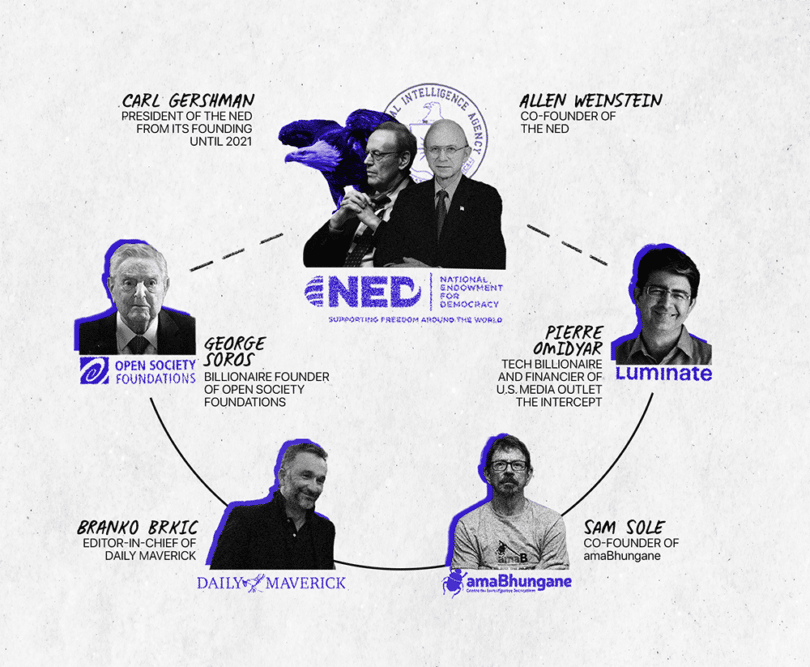In recent weeks, South African public discourse has been focused on concerns about alleged Chinese influence in the country’s media landscape. However, these conversations have tended to overlook the already existing spheres of influence within South African media. Politically motivated sponsorship of prominent South African media outlets by the United States dates back decades to the apartheid era. According to internal U.S. government documents, the aim of these operations was “to counter the strong Marxist campaigns” in the country. This funding was circulated by the National Endowment for Democracy, an organization created by the Reagan administration in order to re-brand U.S. covert operations that were previously carried out by the Central Intelligence Agency. Today, as Washington becomes fixated on combating Beijing’s influence around the world, the National Endowment for Democracy and its private sector partners continue to penetrate large swathes of the South African media ecosystem. This web of influence has caught major publications, including Mail & Guardian newspaper and amaBhungane Centre for Investigative Journalism.
Washington combats Marxism in apartheid-era South Africa
For decades, progress in the struggle against apartheid in South Africa was stymied by Washington viewing the situation through the lens of the Cold War. Despite the atrocities committed by the apartheid regime against the Black majority of South Africa and surrounding countries, the regime was regarded as a strategic bulwark against the spread of socialism and Soviet influence on the continent.
At the tail end of the Cold War, while the United States was aiding apartheid South Africa in its war against the independence struggles in neighbouring Angola and Namibia, officials in Washington simultaneously orchestrated a propaganda campaign in South African media which they claimed would educate the Black population about democracy.
An internal communication from 1986 outlines how the U.S. government funneled hundreds of thousands of dollars to South Africa and recruited local media outlets and journalists to “create awareness of (and hopefully adherence to) democratic ideals and principles among the black communities.” A biweekly feature titled “How Democracy Works” was produced in collaboration with Drum Publications and published in City Press, which was chosen for being “the largest circulation newspaper among blacks in South Africa.” The document outlines various South African writers and editors recruited to contribute to the series, including Percy Qoboza, then editor of City Press, Raymond Louw, and Denis Beckett, editor of Frontline (it is not clear whether these individuals were aware of the U.S. government’s role in the project).
An excerpt from a 1986 U.S. government grant to South Africa states:
It is hoped that a concrete discussion of democratic values will help counter the strong Marxist campaigns now being used to coerce South African blacks in the black townships, pointing the way to democratic forms of government being desirable and achievable goals in South Africa.
“There are no other systematic methods being used in South Africa to generate awareness of democratic principles on a large scale,” the document noted. “Wide propagation of democratic principles can, however, be achieved by publishing material regularly over a period of time in a popular black publication.”
Rather than a gesture of solidarity, this campaign was an example of what was referred to in Washington as “public diplomacy”—U.S. government-sponsored efforts to influence public opinion abroad in ways favorable to its interests. In this case, U.S. officials explicitly laid out their intention to influence South African media to shape narratives in a manner that supported their anti-communist Cold War foreign policy.
“It is hoped that a concrete discussion of democratic values will help to counter the strong Marxist campaigns now being used to coerce South African blacks in the black townships,” the document states, “pointing the way to democratic forms of government being desirable and achievable goals in South Africa.”
Rebranding covert operations with the National Endowment for Democracy
U.S. government funding for the City Press campaign—along with contemporaneous funding for the Institute for the Advancement of Journalism, the Peoples Express community newspaper, and Frontline magazine—was distributed through a then recently created organization called the National Endowment for Democracy (NED). Although branded as a “non-governmental” and “independent, non-profit foundation”, the NED was founded by the U.S. government in 1983 under the Reagan administration. According to its founders, the NED was created as a funding vehicle to take over the covert support of political groups around the world which had previously been carried by the Central Intelligence Agency (CIA) and had developed a tainted reputation.
‘’It would be terrible for democratic groups around the world to be seen as subsidized by the CIA,” said Carl Gershman, who served as president of the NED from its founding until 2021. “We saw that in the 60’s, and that’s why it has been discontinued. We have not had the capability of doing this, and that’s why the endowment was created.”
“A lot of what we [the NED] do today was done covertly 25 years ago by the CIA,” said the organization’s co-founder Allen Weinstein.
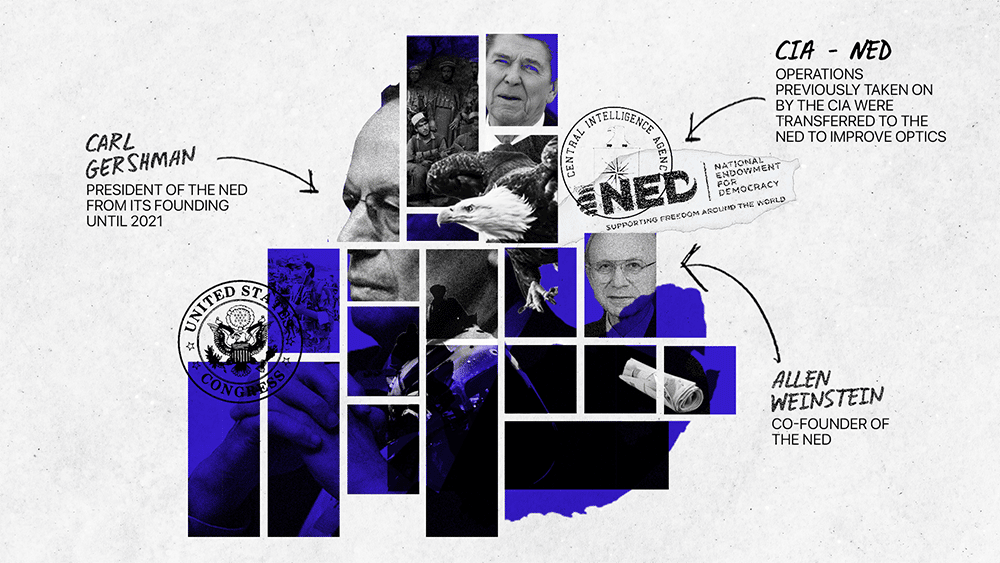
The National Endowment for Democracy was founded in 1983 to take over the covert funding operations of the Central Intelligence Agency.
As the NED was financing its media campaign in South Africa, it was also funding the mujahideen in Afghanistan, pro-contra organizations in Nicaragua, anti-Soviet trade unions in Eastern Europe, and anti-government groups in Grenada. Over the past four decades, the NED’s donation network has expanded into a global empire. With an annual appropriation administered through the U.S. State Department, the NED issues more than 2000 grants each year to non-governmental organizations in over 100 countries. According to the NED’s financial statements, during the decade of 2011–20, the organization issued over $1.2 billion in grants worldwide. The NED’s efforts are amplified by working in concert with aid agencies that have been set up by allied governments along with private foundations, with grant recipients often overlapping between the NED and a network of allied state and private donors.
Today, as tensions between the United States and China rise, Washington is intent on contesting Beijing’s influence around the world, particularly in the Global South. The U.S. government has ramped up its efforts to influence international media and public opinion. Between 2016 and 2020, the NED issued roughly $150 million globally in media-related grants, at least $20 million of which was issued to organizations in sub-Saharan Africa. In December 2021, U.S. President Joe Biden announced that his government would be providing $30 million as “critical seed money” to launch the International Fund for Public Interest Media. The fund connects the U.S. government agencies, including the NED, and the private sector—namely the Luminate foundation of Pierre Omidyar, tech billionaire and financier of U.S. media outlet The Intercept—with the stated goal being to eventually provide $1 billion in global media funding per year, targeting primarily economically vulnerable countries.
South Africa in the crosshairs once again
In this new Cold War, South Africa is once again in the crosshairs. In recent years, the NED has developed close ties with the Johannesburg-based newspaper Mail & Guardian, which describes itself as “the continent’s leading independent newspaper.” In 2020 and 2021, the NED issued $355,200 over four grants to the Adamela Trust, Mail & Guardian’s non-profit foundation through which it receives and administers funding. The NED detailed that the grants were intended to support the launch of Mail & Guardian’s weekly pan-African, WhatsApp-based digital publication The Continent and the building of a regional network of journalists and media outlets. The grants even specified content that The Continent will publish—including a “monthly disinformation column” and “quarterly in-depth investigations on the role of public, private, and non-governmental actors’ roles in disinformation trends in Africa”—raising concerns about whether Washington is wielding influence over editorial decisions at the outlet to target political adversaries in the region.
The concerns about Mail & Guardian’s proximity to Washington are not new. In the past decade, two of the paper’s editors-in-chief have gone on to work for NED-sponsored organizations. In 2015, Chris Roper (editor from 2009-15) left the paper to become deputy CEO of the data journalism initiative Code For Africa—part of the umbrella network Code For All, which is principally funded by the NED—and began a fellowship with the NED-sponsored International Center for Journalists. Similarly, Khadija Patel (editor from 2016-20) resigned from the outlet to chair the NED-sponsored International Press Institute and, in 2021, was named head of programmes of the aforementioned International Fund for Public Interest Media.
Further complicating the picture is Mail & Guardian’s relationship with long time U.S. government partner Open Society Foundations (OSF), the philanthropic foundation of George Soros. In 2017, OSF acquired a majority stake in the paper through its Media Development Investment Fund. The OSF, considered to be the largest private funder of media in the world, is an official partner of the NED’s Center for International Media Assistance (CIMA), whose mandate is to support “U.S.-sponsored development of independent and sustainable media.” The U.S. government has long worked with OSF founder George Soros to sponsor media organizations in furtherance of Washington’s foreign policy agenda—a relationship that CIMA credits with playing an important role in facilitating the dissolution of the Soviet Union:
The breakthrough [in financing media], though, came with the crumbling of the Berlin Wall in 1989. The idea of promoting democracy rapidly grew into a major focus of diplomatic and developmental efforts, and a free press was seen as integral to the process. Backed by major infusions of funding from the U.S. Congress, USAID began pouring resources into supporting independent media in the newly free nations of Eastern Europe and the former Soviet Union. USAID was joined by the State Department and by allied governments, as well as by private funders, most notably by philanthropist George Soros.
Over the past two decades, the NED and OSF have jointly established the Global Forum for Media Development, an international network that presently consists of over 100 media organizations working in around 50 countries. This public-private partnership appears set to continue with the U.S. fixated on containing China and Soros having recently declared that Chinese President Xi Jinping is “the greatest threat that open societies face today.”
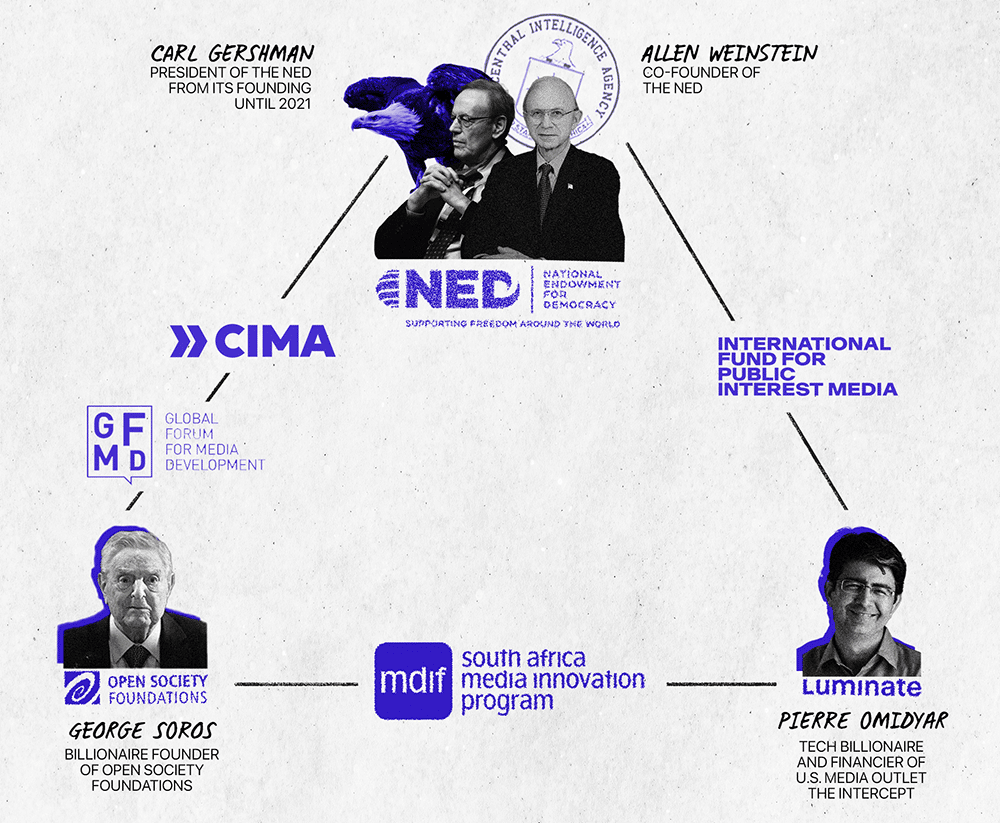
The official media partnerships between the National Endowment for Democracy and U.S. private foundations.
U.S. penetration of South African media today
Washington intentionally partners with private foundations, such as the OSF and Luminate, because they can operate in situations where the U.S. government involvement would not be politically expedient. This strategy was explicitly discussed in CIMA’s inaugural report in 2008:
Private sector funding of independent media abroad … has several advantages over public financing. Private funders can be more flexible … and their programs can operate in countries where U.S. government-funded programs are unwelcome. “In many places around the world, the people we train are more open to participating in programs funded by private sources than those funded by the U.S. government,” says Patrick Butler, ICFJ [International Center for Journalists] vice president.
In addition to purchasing a majority ownership stake in Mail & Guardian, OSF has undisclosed investments in a number of other South African media outlets including Daily Maverick. In August 2017, OSF and Luminate jointly founded the South Africa Media Innovation Program (SAMIP), a multimillion-dollar investment initiative. SAMIP currently supports 24 South African media organizations, including Mail & Guardian, Daily Maverick, The Daily Vox, and the podcasting network Volume. In addition to these investments, OSF and Luminate have also issued over $15 million in media-related grants to South African organizations since 2017, including Ground Up, Africa Check, and Viewfinder, in addition to the aforementioned publications.
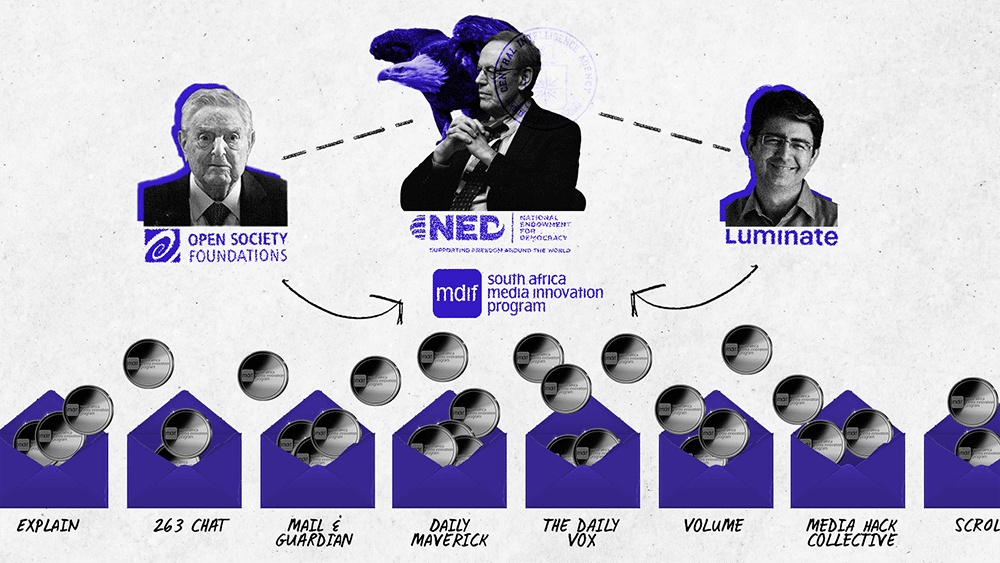
The South African Media Innovation Program, founded by Open Society Foundations and Luminate, currently supports 24 media organizations in South Africa.
Given the well-documented political partnership that exists between these private foundations and the U.S. government, does their financing compromise the independence of their grantees in South African media?
Take, for example, the leading anti-corruption watchdog amaBhungane Centre for Investigative Journalism, an organization which prides itself on being “fiercely independent” and rejecting “funding from governments or corporates”. Founded in 2010 at Mail & Guardian by veteran reporters Sam Sole and Stefaans Brümmer, amaBhungane initially received two-thirds of its funding from the paper and one third from OSF. By 2016 the ratio had reversed, with private foundations accounting for lion’s share of funding and Mail & Guardian only accounting for 29 percent. That same year amaBhungane formally separated from the paper, although the two organizations have continued to work together. From 2016-21, amaBhungane has received approximately $1.4 million from OSF and Luminate.
Although amaBhungane claims that they “do not take funding to investigate specific stories or themes,” this appears to be contradicted by OSF’s financial disclosure. According to OSF, in 2016 “we initiated high-agency work on state capture through our research and advocacy partners” and provided funding to amaBhungane and Daily Maverick specifically “to commence research on the extent of state capture in South Africa” and “on the extent to which state-owned enterprises have been captured by vested interests”.
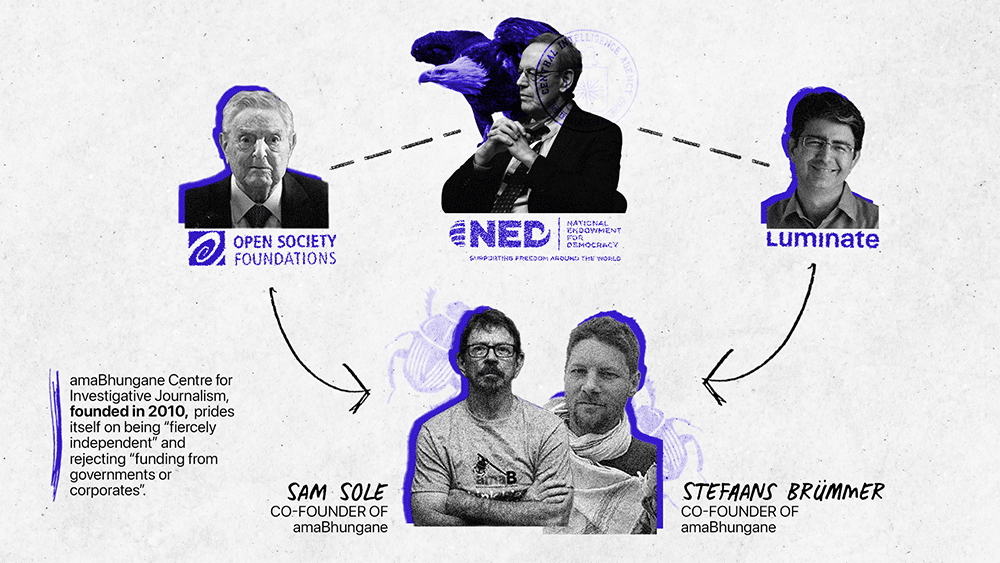
Since 2016, amaBhungane has received approximately $1.4 million in funding from Open Society Foundations and Luminate.
More concerning, however, is the revolving door between amaBhungane staff and U.S. and Western government-sponsored organizations. In the past decade, three of amaBhungane’s senior staff have gone on to work for such entities, primarily to monitor public and private actors in Africa:
- Vinayak Bhardawaj, former advocacy coordinator (2012-14), has gone on to work for Africa Check, which is partnered with the U.S. Embassy in South Africa to “tackle misinformation and disinformation in the media.”
- Karabo Rajuili, former advocacy coordinator (2015-19), has gone on to work for Open Ownership, a corporate ownership watchdog founded by the U.K. government which focuses on Africa and Asia.
- Cherese Thakur, former advocacy coordinator (2020-22), has subsequently joined the corruption reporting team at the South African office of the German government’s international development agency, GIZ.
Beyond this, amaBhungane’s fellowship program has frequently served as a hub to train U.S. government-affiliated journalists in the region. Since 2015, at least 15 amaBhungane fellows have been directly tied to U.S. government programs, including Voice of America staff, members of U.S. embassy-partnered media organizations, U.S. State Department fellows, and employees of the U.S. government-sponsored think tank Freedom House. amaBhungane has also led the formation of a regional investigative journalism network, IJ Hub, in partnership with the Media Institute of Southern Africa (MISA), an NED-sponsored organization that has formed official partnerships with U.S. embassies in the region. According to organizational filings for 2021, amaBhungane has “incubated” the network, which currently has members in Lesotho, Namibia, Malawi, Eswatini, Botswana, Zambia, and South Africa.
amaBhungane’s track record demonstrates a frequent willingness to partner with U.S. and Western government-sponsored organizations as well as go on to work for them. If even the most “fiercely independent” of South African media is caught in Washington’s web of influence, this raises serious concerns about the vulnerability of the country’s media to U.S. penetration. As the new Cold War heats up, the massive financial footprint of U.S. private foundations in South African media—and increasing funding directly from the U.S. government—appears set to continue shaping public discourse in the country.
